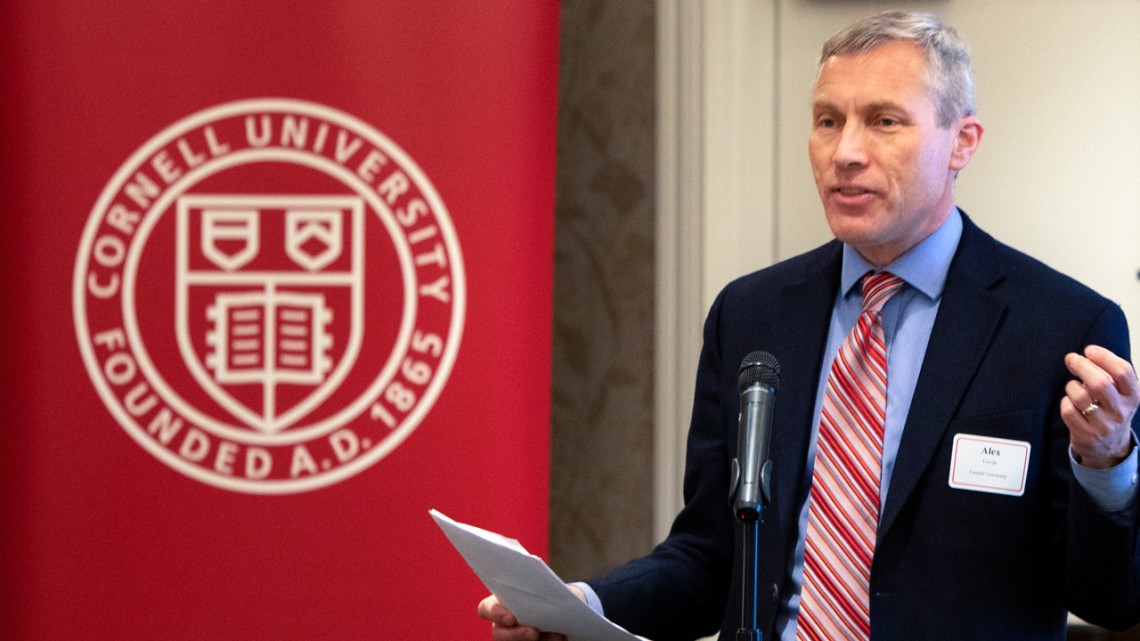
Alexander Colvin, Ph.D. ’99, the Kenneth F. Kahn ’69 Dean at the ILR School, speaks at the Regional Town-Gown Conference.
Regional Town-Gown Conference focuses on labor, employment
By Julie Greco
Community leaders and Cornell experts discussed issues such as childcare, remote and hybrid work, and housing and demographic trends at the Regional Town-Gown Conference, held April 18 at the Hotel Ithaca.
About 70 participants, including city managers, nonprofit executives, faculty and university administrators, attended “Workforce: Challenges and Opportunities,” organized by Cornell’s Office of Community Relations.
“Workforce challenges are impacting all sectors of our college town communities across New York state,” said Susan Riley, deputy director of community relations at Cornell. “We wanted to get folks in the room from different college towns who have experiences managing workforce in a variety of sectors, including higher education, government, hospitality and business. Additionally, we wanted to hear about some of the opportunities in new and emerging work force development.”
Alexander Colvin, Ph.D. ’99, the Kenneth F. Kahn ’69 Dean and Martin F. Scheinman ’75, M.S. ’76, Professor of Conflict Resolution at the ILR School, addressed a range of issues in his keynote address, “From Remote Work to the Latte Wars,” from worker wages to globalization to remote work to the rise of labor action since the pandemic.
“Conflict is inevitable in the employment relationship, but that is something to be addressed and resolved, we can’t stick our heads in the sand and pretend it doesn’t exist,” Colvin said. “Employers and employees do have some opposing interests, including over things as basic as how high wages will be.
“In the end, employment is also a relationship with common interests. Workers need jobs that provide them with a paycheck and a place where they can contribute and have those contributions recognized. Employers need good, committed workers to make their businesses productive and successful. For both sides, there is much to gain by good, cooperative employment relations,” he said.
The day began with a presentation by Jan Vink, extension associate with the Program of Applied Demographics at Cornell’s Jeb E. Brooks School of Public Policy. Vink discussed demographic trends in Central New York, looking at past and projected trends, such as the decrease in adults in every region of New York between 2010 and 2020, and how they relate to characteristics of the current labor force.
ILR Professor Bradford Bell’s presentation, “Recent Workforce Changes – How Does This Impact Recruitment and Retention,” explained that while the pandemic disrupted the workforce, the country was on track for a drop in labor force participation due to an aging workforce and the retirement of baby boomers.
As a result, companies are going to have to continue to work hard at recruiting and retaining employees, said Bell, the William J. Conaty Professor in Strategic Human Resources and director of the Center for Advanced Human Resource Studies.
A panel featuring Amie Hendrix, city manager of Geneva, New York; Cassie Pierre Joseph, director of workforce engagement at Cornell; and Cathy Hart, area general manager for Marriott Hotels, led a discussion on current efforts tied to recruitment and retention of employees.
Another session began with a brief overview of the New York State Office of Strategic Workforce Development’s programs and targeted industry sectors. It featured talks by Amber Rangel, vice president and director of workforce development at Empire State Development; Danielle Szabo, director of workforce innovation at Ithaca Area Economic Development, and Robin Cole, vice president of economic development workforce and career technical education at Monroe Community College.
Breakout activities allowed participants to discuss topics such as hybrid work, housing, demographics and childcare. The childcare session was led by ILR Buffalo Co-Lab Director Cathy Creighton and Buffalo Co-Lab Collaboration and Research Specialist Kricky Ksiazek. Drawing on the Co-Lab’s report, “The True Cost of Child Care: Erie County, New York,” Crieighton and Ksiazek walked participants through the “domino effect” of how low wages for child care workers lead to dire consequences for vulnerable children.
Julie Greco is a senior communications specialist for the ILR School.
Media Contact
Abby Kozlowski
Get Cornell news delivered right to your inbox.
Subscribe
